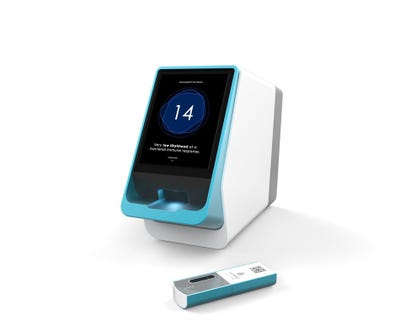Could One Test Help Combat a Massive Problem?
April 21, 2017
MeMed Ltd has been awarded a $9.2M Department of Defense contract to support a rapid point-of-care test designed to distinguish between bacterial and viral infections, ultimately helping to mitigate the misuse of antibiotics.
Kristopher Sturgis

MeMed's second-generation point-of-care test is designed to distinguish between bacterial and viral infections within 15 minutes. The technology could play an important role in the global fight against antibacterial drug resistance.
A relatively new startup in Israel, MeMed Ltd, recently landed a contract from the U.S. government worth up to $9.2 million to fund the completion of a point-of-care technology designed to distinguish between bacterial and viral infections. The device, known as ImmunoXpert, could ultimately play a role in the global fight against antibacterial drug resistance.
The contract was awarded by the Defense Threat Reduction Agency (DTRA), a branch of the U.S. Department of Defense that focuses on protecting the United States and its allies from improvised threats through the integration of expert technologies and capabilities.
"As a young startup in Israel, we asked ourselves what we could bring to the table," Kfir Oved, MeMed's co-founder and chief technology officer, told Qmed. "We said, 'let's use the best detection system to see if we can identify a virus from bacteria.' This contract from the Department of Defense is absolutely critical, not only from a financial perspective, but from a clinical perspective as we try to bring this technology to patients."
Over the past eight years, Oved and fellow co-founder Eran Eden have collaborated with researchers and clinicians from around the world to study the effects on the human immune system when it's fighting infection. Their research has led to the development of a test designed to recognize the difference between a bacterial and viral infection in just 15 minutes.
"We took everything that is out there in terms of data, literature, databases, and so forth -- and we built some software to crunch the data, and came out with a list of 600 potential proteins that we could begin measuring one by one in real critical samples," Oved said. "Eventually, we came up with a very selective subset of biomarkers that basically differentiate between bacterial and viral infections. We then built a set of algorithms that can take these biomarkers and build a signature that could help us develop a very accurate predictive score ranging from zero to 100 that could differentiate between bacterial and viral infection with a sensitivity and accuracy of over 90%."
Oved said the device essentially uses standard immunoassays, and that the company is currently building a measurement technology that could bring central lab levels of accuracy to the point-of-care level -- all on a simple-to-use platform.
"Essentially one will simply have to load a sample into a cartridge, plug that cartridge into the device, and touch the touch screen to start the process. We wanted to provide a very user-friendly experience, while also providing superb analytical performance," Oved said.
Differentiating between viral and bacterial infections continues to be a crucial step towards mitigating the misuse of antibiotics, as well as limiting the growing resistance of antibiotics. Researchers continue to seek answers that can explain antibiotic resistance, as doctors try to limit the misuse and overuse of antibiotics. The ImmunoXpert could go a long way toward preventing both, as viral infections are often mistaken for bacterial infections.
"The problem we're trying to address here is a massive global problem, and we need to be very modest when it comes to statements of solving such a problem," Oved said. "We want to be a very significant part of the solution, but it's difficult to say any single technology can basically solve this problem. Having said that, we definitely see huge value in the ability to reduce antibiotic use. We've created an analytical system that can measure and analyze things that couldn't be measured and analyzed before in a point-of-care setting."
For now ImmunoXpert is CE-IVD certified and approved for use in the European Union, and Oved said MeMed is trying to bring the technology to U.S. patients. The DTRA contract represents a significant confidence in the technology, and the company's ability to deliver a transformative diagnostic tool. Tirat Carmel, Israel-based MeMed is also working to improve the technology to detect infections as early as the pre-symptomatic stages of disease, and the company's second-generation test is already under development.
Kristopher Sturgis is a contributor to Qmed.
[Image credit: MeMed Ltd]
About the Author(s)
You May Also Like

.png?width=300&auto=webp&quality=80&disable=upscale)
